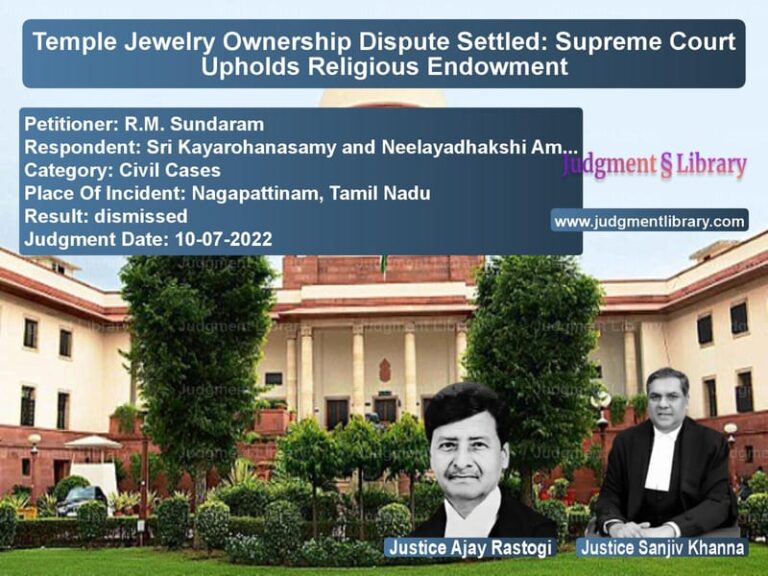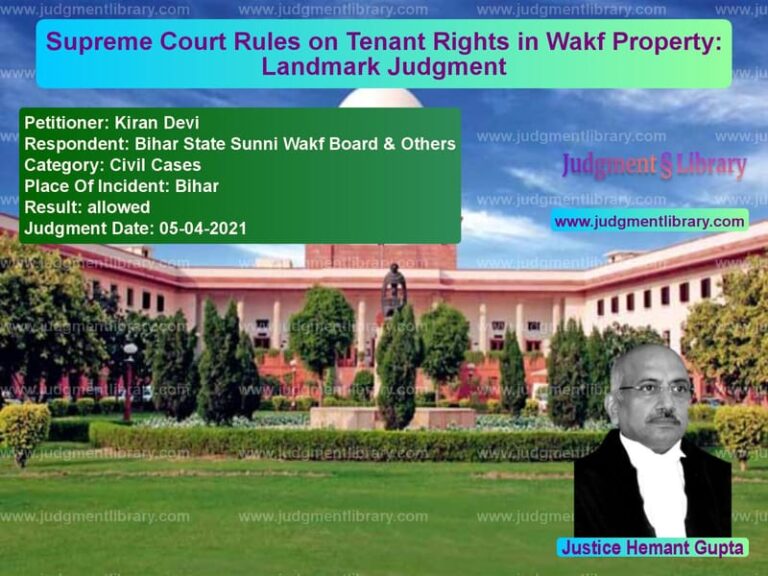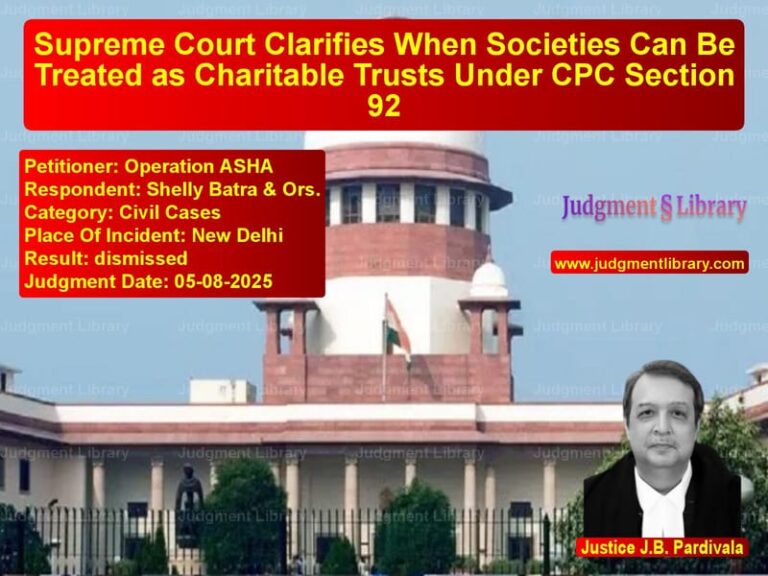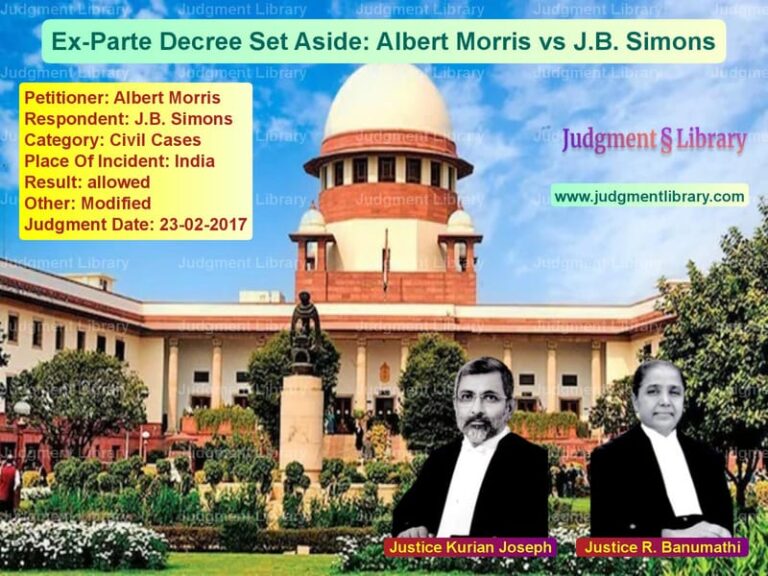Supreme Court Quashes Criminal Case in Kerala: Key Ruling on Reinvestigation and Section 420 IPC
The Supreme Court of India recently delivered a crucial judgment in the case of Peethambaran v. State of Kerala & Anr., addressing the legality of reinvestigation and the threshold for prosecution under Section 420 of the Indian Penal Code (IPC). The case revolved around allegations of cheating in securing government jobs and whether the police had the authority to conduct a reinvestigation without judicial approval.
Background of the Case
The case originated from an FIR registered in October 2015, alleging that the appellant, along with another accused (since deceased), had deceived multiple individuals by promising them jobs as clerks in the Kottayam Rubber Board in exchange for money. The total amount involved was ₹3,83,583. The appellant was accused of playing a role in the fraudulent transactions, and an investigation ensued.
The initial investigation concluded with a final report (FR-I) stating that the allegations lacked documentary evidence and that the case was false. However, the District Police Chief of Kottayam later ordered further investigation, leading to a second final report (FR-II), implicating the appellant.
The appellant approached the High Court of Kerala under Section 482 of the Code of Criminal Procedure (CrPC), seeking to quash the proceedings. The High Court declined to intervene, prompting the appellant to approach the Supreme Court.
Key Legal Issues
The Supreme Court considered two primary questions:
- Whether the non-exercise of power under Section 482 CrPC by the High Court was justified in refusing to quash the case.
- Whether the District Police Chief had the legal authority to order further investigation, leading to the second final report.
Petitioner’s Arguments
The appellant, Peethambaran, challenged the proceedings on multiple grounds:
- The allegations under Section 420 IPC lacked essential ingredients, as no specific role was attributed to him.
- The initial investigation had concluded that there was no evidence of financial transactions, and the second final report was a result of unauthorized reinvestigation.
- The further investigation was, in effect, a de novo reinvestigation, which could only be ordered by a competent court and not by a police officer.
- The prosecution was an abuse of the legal process and ought to be quashed under Section 482 CrPC.
Respondent’s Counterarguments
The State of Kerala opposed the appeal, arguing:
- The second final report was the result of a valid further investigation, which was permissible under Section 173(8) CrPC.
- The case should proceed to trial as there was sufficient evidence to establish the offence of cheating.
- The High Court had rightly refused to quash the proceedings, as quashing an FIR at the investigation stage should be an exceptional remedy.
Supreme Court’s Observations and Ruling
The Supreme Court carefully examined the legal framework governing further investigation, fresh investigation, and reinvestigation. It referred to precedents, including Vinay Tyagi v. Irshad Ali and TT Antony v. State of Kerala, to draw a clear distinction between the permissible further investigation and impermissible reinvestigation.
The Court held:
“The power to order further investigation under Section 173(8) CrPC rests with the investigating officer, but such investigation should not amount to a reinvestigation or de novo inquiry without judicial authorization.”
It further noted:
“In the present case, the second final report was a result of an order passed by the District Police Chief, which is beyond his legal authority. Such an order could have been passed only by a Magistrate or a higher court.”
Regarding the offence under Section 420 IPC, the Court emphasized that to constitute cheating, the prosecution must establish:
- A false representation.
- The accused had prior knowledge that the representation was false.
- The accused made the false representation with dishonest intent to deceive.
- The accused induced the victim to deliver money or property based on the false representation.
The Court found that the prosecution had failed to provide material evidence demonstrating these elements. It ruled:
“No material has been placed on record to show that the representation made by the accused was false or that they had prior knowledge of its falsity. Mere failure to secure jobs does not amount to cheating under Section 420 IPC.”
Final Verdict
In light of these findings, the Supreme Court set aside the High Court’s decision and quashed the criminal proceedings. It concluded that:
- The further investigation conducted under the direction of the District Police Chief was illegal.
- The case lacked sufficient evidence to sustain the charge under Section 420 IPC.
- Continuing the prosecution would amount to an abuse of the legal process.
The appeal was allowed, and all proceedings in the case were quashed.
Key Takeaways from the Judgment
- The District Police Chief does not have the authority to order further investigation; such power rests with the Magistrate or higher courts.
- Further investigation must be distinguished from reinvestigation or de novo inquiry, which requires judicial approval.
- For an offence under Section 420 IPC, mere failure to fulfill a promise does not constitute cheating unless there is evidence of a false representation made with dishonest intent.
- The Supreme Court reaffirmed that criminal proceedings must not be used as a tool for harassment, especially in cases where the allegations do not meet the legal threshold.
Conclusion
This ruling strengthens the principle that reinvestigations must follow due legal process and ensures that prosecutions under Section 420 IPC are not pursued without sufficient evidence. By quashing the criminal case against the appellant, the Supreme Court reaffirmed the importance of procedural fairness in criminal investigations.
Petitioner Name: Peethambaran.Respondent Name: State of Kerala & Anr..Judgment By: Justice Krishna Murari, Justice Sanjay Karol.Place Of Incident: Kottayam, Kerala.Judgment Date: 03-05-2023.
Don’t miss out on the full details! Download the complete judgment in PDF format below and gain valuable insights instantly!
Download Judgment: peethambaran-vs-state-of-kerala-&-an-supreme-court-of-india-judgment-dated-03-05-2023.pdf
Directly Download Judgment: Directly download this Judgment
See all petitions in Fraud and Forgery
See all petitions in Bail and Anticipatory Bail
See all petitions in Judgment by Krishna Murari
See all petitions in Judgment by Sanjay Karol
See all petitions in allowed
See all petitions in Quashed
See all petitions in supreme court of India judgments May 2023
See all petitions in 2023 judgments
See all posts in Criminal Cases Category
See all allowed petitions in Criminal Cases Category
See all Dismissed petitions in Criminal Cases Category
See all partially allowed petitions in Criminal Cases Category







